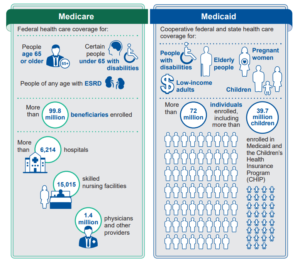UNDERSTANDING
MEDICARE vs MEDICAID
Medicare and Medicaid are two separate, government-funded & operated health insurance programs with significant cost differences and covered services.
 Medicare is a federal program consisting of four parts (Part A, Part B, Part C and Part D) that provides health coverage if you are 65 years of age or older or if you are under 65 with a qualifying disability. Medicare, simply put, is complex but understanding the different parts of Medicare and the services each part helps cover can help make navigating your senior healthcare options much easier:
Medicare is a federal program consisting of four parts (Part A, Part B, Part C and Part D) that provides health coverage if you are 65 years of age or older or if you are under 65 with a qualifying disability. Medicare, simply put, is complex but understanding the different parts of Medicare and the services each part helps cover can help make navigating your senior healthcare options much easier:
- Part A provides inpatient/hospital coverage
- Part B provides outpatient/medical coverage
- Part C offers an alternate way to receive Medicare benefits privately through Medicare Advantage Plans which offer the same benefits as original Medicare but can do so with different rules, costs and coverage restrictions
- Part D provides prescription drug coverage
Medicare is NOT income-based but Medicaid is as Medicaid is a state and federal program that provides health coverage for low-income individuals. Here in Massachusetts, we have MassHealth as our state-funded Medicaid program that offers health-care benefits directly or by paying part or all of your health-insurance premiums. In order to apply for MassHealth benefits, a MassHealth application needs to be completed and an individual/individuals must be deemed eligible. Eligibility criteria for MassHealth/Medicaid is as follows:
- Must be a MA resident whose financial situation is characterized as low income or very low income. Per the gov website, income eligibility for MassHealth benefits is as follows:
- A US national, citizen, permanent resident or legal alien in need of healthcare assistance
In addition, MassHealth offers different types of coverage based on whether you are:
- 65+ and need personal care services in order to live at home
- 65+ and disabled and are either working 40 or more hours a month or are currently working and have worked at least 240 hours in the 6 months immediately before the month of the application
- Not working or unable to work
- Living at home and you do not need long-term care
- Living at home and you need long-term services and supports under a Home- and Community-Based Services Waiver
- In or waiting to be admitted to a long-term care facility
More information on MassHealth can be found on the mass.gov website.
Applying for MassHealth? Ask an Expert
As you can imagine, the MassHealth application process can be quite grueling and time consuming and qualifying for such state-funded benefits is not easy. This is precisely why it is recommended that you seek the guidance of an elder law attorney or MassHealth application specialist to assist you with this process. The good news is that there are plenty of incredibly knowledgeable professionals who can assist you and/or your loved ones and help you navigate the confusing and unchartered waters of the MassHealth process. For recommendations on an expert in your area, contact us and we will be happy to provide you with a tried-and-true referral- FREE OF CHARGE AND NO OBLIGATION!
For further information on Medicare and Medicaid, refer to this helpful pamphlet to help remind you of the basics of the two programs and each program’s covered services.

